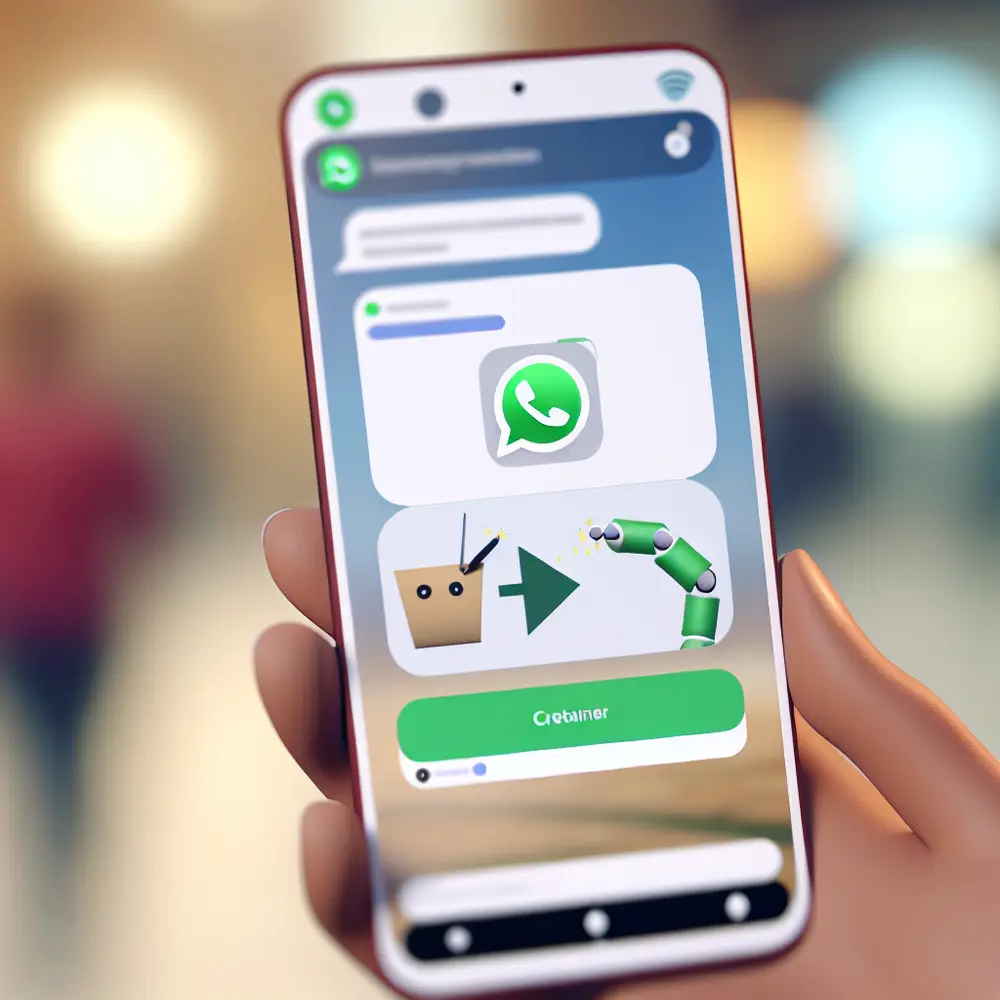In today’s fast-paced digital landscape, businesses are constantly seeking innovative ways to engage with their customers and streamline their operations. One of the most revolutionary solutions to emerge in recent years is the automated sales bot, particularly through popular messaging platforms like WhatsApp. As communication increasingly shifts towards instant messaging, companies are turning to sales bots to effectively bridge the gap between customer inquiries and timely responses, resulting in improved customer relations and higher conversion rates.
Imagine being able to respond to customer queries 24/7 without the need for human intervention. That’s precisely what a sales bot can do. By automating responses and providing instant access to information, businesses can not only enhance the customer experience but also free up valuable resources for more complex interactions. This leads to a more efficient sales process, allowing companies to focus on strategies that drive growth while maintaining a high level of customer satisfaction.
In this article, we will explore how automated sales bots are transforming sales optimization, particularly through WhatsApp. We will delve into the steps for creating an effective sales bot, the key features that make them essential tools for modern businesses, the challenges of implementation, and real-life success stories that demonstrate their impact. By understanding the potential of sales bots, you can position your business for success in an increasingly competitive marketplace.
Transforming Customer Engagement with Sales Bots on WhatsApp
Automated sales bots are revolutionizing the way businesses engage with customers through messaging applications like WhatsApp. A sales bot is a programmed tool that interacts with potential clients, answering questions, providing information, and sometimes even processing transactions. With the rise of digital communication, companies are finding that leveraging a sales bot can significantly optimize their sales process, enhance customer service, and improve overall efficiency.
Implementing a sales bot on WhatsApp can streamline numerous aspects of customer interaction. For example, businesses can set up automated responses to frequently asked questions, ensuring that inquiries are addressed instantly—even outside of regular business hours. This immediacy not only satisfies customer curiosity but also increases the chances of lead conversion, as customers receive the information they need without delays. Additionally, a sales bot can help qualify leads by asking pre-determined questions, enabling sales teams to focus their efforts on the most promising prospects.
Furthermore, as more people turn to WhatsApp for communication, it serves as the perfect platform for sales bots to thrive. The availability of instant messaging allows businesses to connect with customers in real-time, reducing the friction that often accompanies traditional sales methodologies. With the right setup, companies can engage their audience directly, creating a personalized experience that meets individual needs and preferences.
Moreover, businesses can analyze data from interactions processed by these bots to gain insights into customer behavior and preferences. This information can be invaluable in refining marketing strategies and optimizing sales techniques, ultimately leading to better outcomes. By harnessing the power of sales bots on WhatsApp, companies can not only retain customers but cultivate loyalty, making these automated tools indispensable in modern business strategies.
Key Features of Successful Sales Bots on WhatsApp
WhatsApp has emerged as one of the most effective messaging apps for sales optimization, providing businesses an innovative channel to engage with customers in real-time. As a platform frequented by billions, it facilitates seamless communication, making it an ideal choice for implementing a sales bot that can enhance the overall customer experience. By integrating automated sales processes into WhatsApp, businesses can ensure that they are reaching their customers where they are most comfortable, thus increasing the chances of successful conversions.
A sales bot on WhatsApp can provide numerous advantages, starting with instant responses to customer inquiries. Automation allows businesses to configure the bot to answer frequently asked questions about products, services, and pricing, which frees up valuable time for human agents to focus on more complex issues. Furthermore, the sales bot can offer personalized suggestions based on customer preferences or past interactions, showcasing the ability of businesses to use data to create a tailored shopping experience. This level of engagement fosters loyalty and enhances the likelihood of repeat purchases.
Another critical benefit of utilizing a sales bot on WhatsApp is the potential for 24/7 availability. Customers today expect immediate access to information and support. By implementing an automated solution, businesses can ensure that prospective buyers receive timely answers at any hour, accommodating various time zones and working hours. This immediacy can significantly improve customer satisfaction and can play a major role in converting leads into sales, as customers often prefer channels that provide quick resolutions.
To create an effective sales bot on WhatsApp, businesses must first define their objectives and understand their target audience. This ensures the bot is programmed with the right responses and capabilities to meet customer needs. However, it is equally important to continually monitor and refine the bot’s performance by analyzing customer interactions and feedback. This iterative approach not only enhances the sales process but also enables businesses to stay relevant and responsive to customer demands in a fast-paced digital marketplace. As a versatile messaging app, WhatsApp combined with a well-designed sales bot can serve as a powerful tool for any business aiming to boost sales and improve customer relations.
Steps to Create an Automated Sales Bot for WhatsApp
Creating an automated sales bot for WhatsApp involves several key steps to ensure it meets your business needs while effectively engaging customers. First, it’s essential to define the objectives of your sales bot. Identify what tasks the bot will handle, such as answering frequently asked questions, guiding customers through product choices, or taking orders. This clear purpose will guide the design and functionality of the bot, ensuring it aligns with sales optimization strategies.
Next, choose a platform to build your sales bot. There are several user-friendly tools available that cater to different levels of technical expertise. Platforms like Dialogflow, Chatfuel, or ManyChat allow you to create bots with minimal coding knowledge. These tools provide templates and drag-and-drop features that simplify the bot creation process, enabling you to focus more on crafting the perfect messaging experience rather than the technical underpinnings.
Once you have selected a platform, the next step is to design the conversation flow. Create a script that covers various customer interactions, ensuring it feels natural and engaging. Use simple and concise language, and consider incorporating buttons or quick replies to facilitate smoother communication. It’s also beneficial to include fallback responses for scenarios where the bot may not understand user requests, ensuring that the conversation always stays on track and customer queries are addressed effectively.
After your bot’s conversation flow is established, it’s time to test and refine it. Launch a beta version of your sales bot with a small audience to gather feedback. Monitor conversations to identify pain points or areas where users struggle, and make necessary adjustments to improve the overall experience. Continuous testing and updates will help you keep the bot relevant and effective in responding to customer needs, which is critical for maintaining high levels of engagement and satisfaction.
Overcoming Challenges in Implementing a Sales Bot
Implementing a sales bot on WhatsApp presents several challenges that businesses need to navigate effectively for successful deployment. One of the primary obstacles is ensuring that the bot maintains a human-like interaction while being automated. Customers often prefer engaging with a human, particularly in complex situations. To counter this, businesses can leverage advanced natural language processing (NLP) capabilities, enabling the bot to understand and respond to inquiries in a contextually relevant manner. Moreover, incorporating a seamless transition process from the bot to a human agent when necessary can greatly enhance customer satisfaction.
Another significant challenge is aligning the sales bot’s capabilities with the existing sales optimization strategies. It is crucial for a sales bot to integrate with tools like customer relationship management (CRM) systems to provide real-time insights and comprehensive customer data. To overcome this, businesses should take the time to map out their existing sales processes and identify pain points that a sales bot can address. Creating a detailed how-to guide that outlines step-by-step procedures for integration will empower teams to implement the bot effectively and maximize its benefits.
Additionally, ensuring data privacy and compliance with regulations is imperative when implementing any automated solution. Customers are increasingly aware and concerned about how their data is used and shared. To tackle this, businesses should prioritize transparency, clearly communicating how customer information will be handled. Establishing robust security measures, such as encryption and access controls, is essential in building trust with customers and minimizing legal risks.
Lastly, ongoing maintenance and optimization of the sales bot are vital for long-term success. After deployment, the bot requires regular monitoring and updating to adapt to changing customer preferences and business needs. Utilizing analytics to assess performance metrics, such as response time and resolution rates, can provide valuable insights for continual improvement. Empowering teams with the knowledge and tools to refine the bot’s functionalities will ensure that it remains a valuable asset in the sales optimization process on WhatsApp.
Success Stories: Real-Life Implementations of Sales Bots
Real-life success stories of businesses leveraging automated sales bots on WhatsApp highlight the significant impact of automation on sales optimization. Companies across various industries have harnessed the power of sales bots to enhance customer interactions, streamline processes, and ultimately drive revenue. One prominent example is a retail brand that experienced a 30% increase in sales after integrating a sales bot. The bot handled inquiries about product availability, processed orders, and provided personalized recommendations to customers, all without human intervention.
In the hospitality sector, a hotel chain implemented a sales bot to manage bookings and customer inquiries. This bot was designed to respond to common questions regarding amenities, availability, and pricing. The results were remarkable: the hotel chain reported a reduction in response time from hours to seconds, which improved customer satisfaction rates and increased direct bookings. By automating routine tasks, the hotel staff could focus on providing exceptional service, leading to a more engaged and satisfied customer base.
Another noteworthy story comes from a small business specializing in handmade goods. By deploying a sales bot on WhatsApp, they were able to automate order confirmations and payment links. This not only freed up valuable time for the owner but also enhanced the customer experience by providing real-time updates. The business saw a 40% increase in repeat customers, as buyers appreciated the seamless interaction and efficient service provided by the sales bot.
An e-commerce company also capitalized on a sales bot to facilitate upselling and cross-selling. By analyzing customer data and past purchase behavior, the bot was able to suggest complementary products during the checkout process. This strategy not only maximized each transaction’s value but also improved customer engagement by providing personalized shopping experiences. The e-commerce site reported a substantial increase in average order value following the implementation of the bot.
The Future of Sales: Embracing Automation
The future of sales is undoubtedly intertwined with the rise of automation and the increasing reliance on messaging apps for customer interactions. Sales bots, particularly those integrated with platforms like WhatsApp, are leading this evolution by revolutionizing how businesses engage with their customers. By leveraging advanced algorithms and machine learning, these bots provide timely, personalized responses to inquiries, ensuring that potential buyers receive the attention they need at every stage of their journey. For business owners and sales managers, implementing a sales bot on WhatsApp isn’t just a trend—it’s a strategic move toward improving overall sales optimization.
A well-designed sales bot can significantly enhance the customer experience by offering 24/7 availability. This means that customer inquiries or issues can be addressed in real time, reducing waiting periods and improving satisfaction rates. The automation of responses allows human agents to focus on more complex tasks, fostering a more efficient allocation of resources. For customer service professionals, this leads to increased productivity as they are empowered to handle high-stakes interactions while the bot manages routine inquiries. The seamless integration of sales bots can transform your sales funnel, driving higher conversion rates and maximizing revenue potential.
Moreover, the data collected from interactions with the sales bot can provide invaluable insights into customer preferences and behaviors. Analyzing this data helps businesses shape their marketing strategies and tailor their offerings accordingly. By understanding what resonates with customers, businesses can refine their approaches, ensuring they meet the evolving demands of the market. As companies increasingly turn to data-driven decision-making, the role of sales bots becomes even more crucial. They do not only assist in direct sales but also inform long-term strategic planning by uncovering patterns and trends in customer interactions.
In conclusion, the fusion of automation and messaging apps like WhatsApp is set to redefine how sales are conducted in the coming years. Business owners, sales managers, and customer service professionals must be prepared to embrace this shift by adopting sales bots. Not only do they streamline operations and enhance customer satisfaction, but they also position businesses at the forefront of innovation in their respective industries. As the digital landscape continues to evolve, harnessing the power of sales bots will be essential for staying competitive and capitalizing on the immense opportunities presented by automated sales solutions. The CRM for WhatsApp is essential for companies wishing to thrive during this transformative period.









